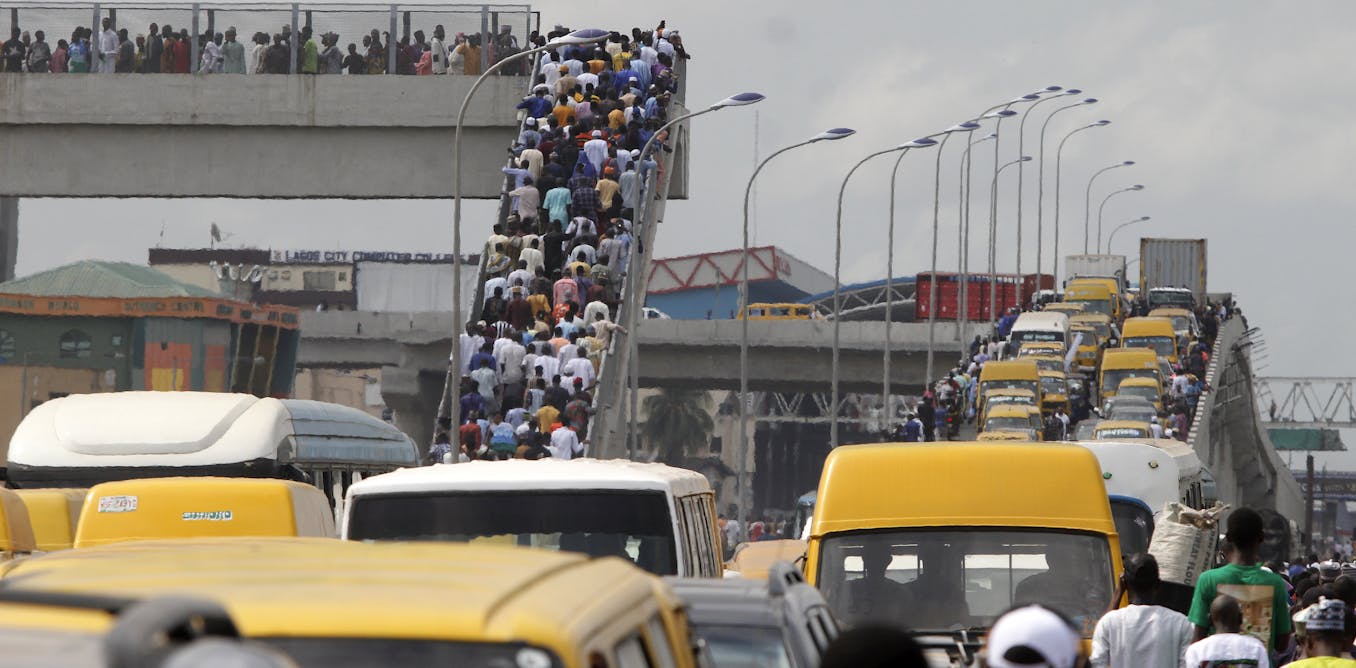
Crimes that were previously associated with Nigeria’s northern region – like kidnapping for ransom and terrorism – appear to be spreading to the south-west region, including Lagos. Adewumi Badiora, an urban and community safety researcher, outlines urgent steps that must be taken to keep banditry and insecurity out of Lagos.
What is the current state of banditry and terror attacks in Nigeria?
Banditry has existed for years in Nigeria. State security officers call it a complex, violent crime involving terrorism, jihad insurgencies, armed robbery, murder, kidnapping, rape and the illegal possession of firearms. It has gained a base in the country’s north-eastern, north-western and some north-central states.
According to the Armed Conflict Location and Event Data Project, activities by bandit gangs increased by 731% between 2018 and 2022, and there were around 13,485 banditry-related deaths between January 2010 and May 2023.
How do we know Lagos could be a target and why?
In July 2022, the Nigeria Security and Civil Defence Corps placed all its state commands on alert following intelligence reports that elements of the Boko Haram terrorists as well as those of Islamic State West Africa Province had heightened plots to attack Nigeria’s commercial capital, Lagos.
Several other threats have been issued since then but none seems to have been fully carried out.
Crimes like kidnappings have become increasingly common in the Nigerian south-west, however, including Lagos. Recent research by the polling service NOIPolls put south-west as the epicentre of kidnapping after north-central.
Large attacks in the country’s south-west were relatively rare until double massacres in Owo, Ondo state, in 2022. These attacks have been traced to bandits.
In January 2024, gunmen on the Lagos-Ibadan corridor abducted political figures. The same month, gunmen killed two traditional rulers in Ekiti state. In May, seven travellers were abducted and another one killed by bandits on the Sagamu-Ijebu-Ode expressway.
These are some of the signs that insecurity is being experienced within the Lagos region.
In my recent research, I identified that Lagos could become a target for banditry and terrorism for several reasons. I surveyed a total of 288 residents of Lagos to find out their concerns for safety and implications for individual and city-level security planning.
First, Lagos has a vulnerable population. Terrorist groups aim to harm innocent people to gain political attention or military objectives. Any attack on a part of Lagos (like a church, mosque, market or bus stop) is likely to cause mass deaths of innocent people.
Second, Lagos has strategic political and economic importance in Nigeria and Africa. A bandit attack would undermine this and make an impact on the nation’s economy, politics and governance.
Like Abuja, Lagos is heavily protected. A bandit attack that penetrated the city’s security would have propaganda value.
There is widespread youth unemployment and inequality in Lagos, and different ethnic groups coexist. This creates tension which could enable bandit groups to mix with residents, particularly disadvantaged youth in the slum settlements.
In my research, 37% of my respondents said their families or community members had experienced shooting or kidnapping in Lagos. For most of my respondents, this happened during clashes among different violent groups. Respondents also mentioned cases of kidnapping and other violent crime.
These residents of Lagos appeared afraid. My research respondents (78%) were very concerned about their safety. Almost all (90%) had been forced to make changes in their daily lives. Some were considering moving away. Women and girls were the worst affected. Some communities had taken greater safety precautions.
What are the implications of this threat?
My research findings show that if this trend of spreading insecurity continues, farmers may become more frightened to go to farm, causing food insecurity.
The livelihoods of people who work and trade in the informal sector and formal businesses could be undermined by banditry.
Enterprises may begin to close or relocate, and this would add to the youth unemployment crisis.
Lagos is the foremost commercial hub of Nigeria, offering manufacturing and a huge, accessible market within the African economic zone. The embryonic banditry around the city borders poses a severe risk to this regional economic growth.
What urban design security planning must be done to make Lagos secure?
Based on the results of my study, I outline some of the things that could turn the tide of banditry and insecurity in Lagos:
- ensure perpetrators and their sponsors are caught and face the law
- beef up security and check-points on all roads and in public places and forests in the south-west
- address underlying socio-economic drivers and enablers of insecurity
- push for state policing or reinvigorate the Amotekun security approaches with training and equipment (Amotekun is a paramilitary security network)
- enable local communities to fight banditry, as opposed to top-down strategies.
Further planning of Lagos should prevent excessive sprawl and vulnerable development at border communities. At present, Lagos has over 157 vulnerable communities deserving of urgent planning attention. These areas have been identified as tactical shelters for criminals.
Bandits sometimes use motorcycles to attack soft targets. Urban design that uses physical barriers should be considered. Small bends, bumps or turns in roads could limit the speed at which motorcycle attacks can be launched.
Improved policing and smart monitoring systems, such as smart CCTV and advanced street lighting, would help.
Cooperation from Lagos residents concerning intelligence gathering is vital. Residents should be more vigilant and report security issues to the police as soon as possible.
The approach should allow community members to take ownership of and actively participate in addressing banditry issues and challenges facing them.![]()
Adewumi I. Badiora, Senior Lecturer, Department of Urban and Regional Planning, Olabisi Onabanjo University
This article is republished from The Conversation under a Creative Commons license.


